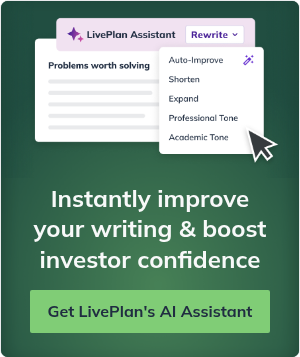I tried the “Deep Research” features in ChatGPT and Gemini. Here’s what I found.

Jump to
“Deep Research” is a feature for paid ChatGPT and Google Gemini subscribers that takes whatever question or project that you have and then scours the web (and presumably their own data sets) for answers. Both tools then assemble a detailed, multi-page report on their findings, including citations, links to source materials, and conclusions. While not perfect (no AI tool is), they represent a significant leap forward for AI’s market research capabilities.
I used the Deep Research tools to do a competitive analysis for my product (LivePlan) and also set the tools loose on a more open-ended project to do market research on a common customer type that we often see using LivePlan.
While the two tools both produced impressive results, there are some core differences.
Prompt Crafting
Out of the gate, ChatGPT’s Deep Research tool always asks clarifying questions before it sets off on its research task. I found this extremely helpful. It guided me to refine my thinking and ensured that the results of the research met my needs.
Gemini doesn’t do this. While it presents you with a research plan that you have the opportunity to edit before giving it the go-ahead, it hides the research plan under an expandable widget and doesn’t encourage refinement. You certainly can refine the research plan, but the bot doesn’t proactively encourage you to.
Further Reading
Structure of Responses
At first glance, both versions produce very impressive results—something that you could have imagined paying a consultant for or having someone in your company work on for a few days.
Both Deep Research tools structure their responses in the form of a research paper with section headings and even sub-headings.
Gemini’s format is much more formal than ChatGPT’s, with numbered chapters and subheadings and even an executive summary of the report. Overall, it’s a better designed presentation.
ChatGPT, while less formal in its structure, highlights key findings and insights in bold so the document is easy to skim.
Both AI tools structure any relevant data they surface in tables when needed to present findings more clearly. Gemini has a bit of an edge here — especially in the competitive comparison analysis that I had it do. It created multiple structured tables to compare key differences across several different factors, while ChatGPT relied more on prose output.
Accuracy
I dug in and fact-checked everything that each of the chatbots included in their respective reports and found them to be accurate. This is a major improvement for AI chatbots. The improvement in “honesty” and the lack of hallucination may only be true for the “deep research” queries, though. And, keep in mind that I only ran a few reports and didn’t do an exhaustive analysis of accuracy for several different types of research.
I certainly would still be careful treating the reports as 100% accurate, though. The AI chatbots have a history of getting things wrong and I would check the facts carefully before presenting the information or making crucial decisions.
That said, the reports from both Gemini and ChatGPT make fact checking easy—virtually every data point presented has a citation and it’s easy to click through to the source and see the data that was extracted and the context that it was originally presented in.
In fact, both chatbots at times included multiple data sources for a fact—Gemini had a tendency to do this more often than ChatGPT. And, when Gemini found multiple sources that had conflicting information, the research reported noted this and drew a conclusion about what data was more accurate.
However, Gemini also relied on several sources that didn’t include research-backed or survey-backed facts. Depending on your use case for these tools, that may or may not be important. ChatGPT, on the other hand, relied almost exclusively on data that was backed by actual research.
Overall, I’d give a very slight edge to ChatGPT’s Deep Research in the accuracy department, although both tools are very solid in this area.
Drawing Conclusions
Both chatbots struggled when they tried to combine multiple data sources to draw conclusions.
First, it must be said that both tools impress when they gather facts from various data sources and work to stitch together the findings to further the research. The fact that they even try to do this is a plus and helps surface complimentary research resources that you should be considering as you do your own research.
That said, there were a few logic errors that the bots made – forgetting some of the research and only using certain data points to draw conclusions.
For example, in the target market research task I had the Gemini tackle, I was looking to get a better understanding of the number of QuickBooks users who have companies in the $500k-$5m revenue range.
Gemini determined how many businesses exist in the US in that revenue range and also found a market share number for QuickBooks. It also surfaced that only about 50% of companies of this size use accounting.
From there, it tried to estimate the number of businesses that use QuickBooks, but unfortunately it just multiplied the QuickBooks market share number by the number of businesses, forgetting to take into account the fact that half of these businesses don’t even use accounting software at all.
It’s amazing that Gemini surfaced all of this data, but the conclusion was incorrect. If I hadn’t been reading the report carefully, I could have trusted a finding that was incorrect.
Just as I recommend double-checking your data sources, I would be sure to double-check any conclusions the bots make – especially when it involves combining multiple data sources and findings.
Citations
For my market research project, ChatGPT dug up 18 sources while Gemini rounded up an impressive 47. Obviously, quality is more important than quantity, and both bots arrived at similar conclusions despite the massive difference in data sources.
ChatGPT makes checking its sources easy – they’re listed in-line and are clickable. Gemini hides them behind expandable widgets, but they are there at the end of every paragraph. Both bots also include a full bibliography.
The citations aren’t presented quite so well once the report is exported, however. ChatGPT’s are more useful because it retains inline links. The bibliography is not linked on export. Gemini’s export uses un-linked footnotes to a bibliography that does link directly to sources.
Overall, the research reports are most useful when viewed in the respective web apps and less useful when exported – even though Gemini has a native Google Docs export.
Sharing
Because the reports degrade a bit on export – mostly with the handling of citations – sharing isn’t great. In ChatGPT, you can share the chat thread, but that serves a pretty limited purpose.
Gemini allows for an export to Google Docs, but that’s it.
Sharing and collaboration are definitely areas for improvement in both tools.
Revisions and follow-ups
Both Deep Research tools allow for follow-up questions, and you can even request revisions to the research. But these areas are a bit buggy.
As I asked ChatGPT to make revisions, the document got shorter and shorter. The core findings didn’t change, but the request for revisions seemed to run a prompt to “summarize” the larger research document and ended up removing many of the findings. While the initial report had value, working with ChatGPT to refine it didn’t seem to function very well.
Gemini, on the other hand, just seemed to crash several times on revision requests. It often didn’t answer requests for revisions and several times replied that it “couldn’t make that change right now”. I assume the the system is just overloaded and that this functionality will start to work more consistently over time.
Final thoughts
Beyond just gathering and synthesizing data, the tools can think critically and even make recommendations based on findings. For example, using the competitive research they gathered, both tools were able to make smart recommendations for my products’ marketing and positioning.
Both Deep Research tools are indeed impressive. They’re incredible time savers and should be in everyone’s toolbox. If you ever need to do research, the tools offer an incredible jumping off point and can help summarize complex topics and surface interesting data from any public data source.
At this point, I can’t declare a “winner.” Just pay for one of them and put it to work.
More in Planning

planning
How to Write a Bakery Business Plan + Sample

planning
How to Write an Online Fitness Business Plan

planning
How to Write a Small Restaurant Business Plan + Free Sample Plan PDF

planning









